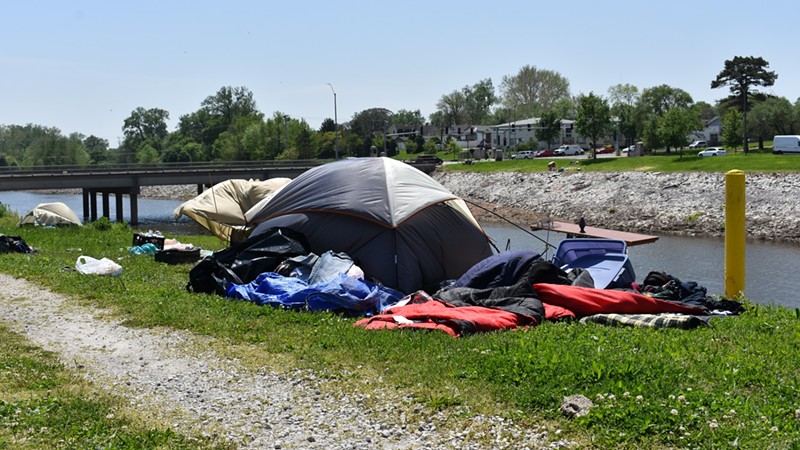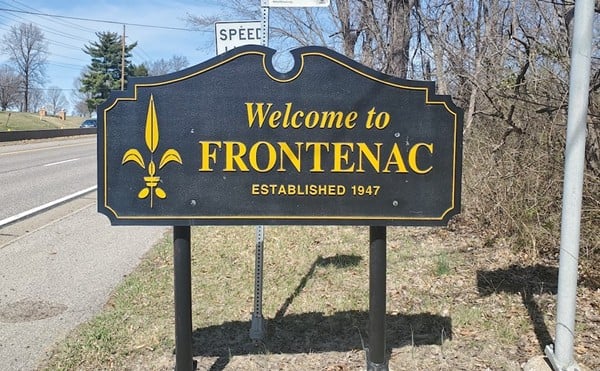Missouri Homelessness Bill Would Make Sleeping on State Land a Crime
State Representative Bruce DeGroot’s (R-Chesterfield) bill on homelessness is, he admits, not a perfect one.
His bill, now awaiting approval from Governor Mike Parson, would transform the way Missouri handles homelessness.
Homeless encampments on state-owned land would be banned. After one warning, anyone found camping on state land would face a Class C misdemeanor, a charge punishable with up to a $750 fine and 15 days in jail.
The bill would allow the state attorney general to bring lawsuits against municipalities that refuse to enforce the ban, and it would penalize municipalities with rates of homelessness higher than the state average by taking away state grant funding for homeless services.
Leaders of Missouri nonprofits who work to help the unhoused have loudly spoken against the bill, which they argue would “criminalize homelessness.”
DeGroot knows how it looks.
“I don’t think it’s a perfect bill, but I think it’s a good first step,” DeGroot tells the RFT.
DeGroot and Senator Holly Thompson Rehder (R-Sikeston), who sponsored the bill in the Missouri Senate, see the bill as a way to bring the unhoused to safer, supervised areas with access to supportive services. The legislation passed in early May as an amendment to House Bill 1606.
DeGroot says criminalizing homelessness is not the primary purpose of the bill, yet he felt a provision on legality was necessary.
“If it isn’t backed up by threat of criminal enforcement, people won’t get off the streets, and that is truly the intent of the bill,” DeGroot says. “It is inhumane for people to live on the streets, where they’re subject to the elements and therefore have a much lower life expectancy.”
State Representative Robert Sauls, a former Jackson County prosecuting attorney, doubts prosecutors will actually seek charges if Missouri’s bill becomes law.
“As far as prosecuting, I think it would be extremely difficult based on the fact that there’s no residence to issue a summons to for someone who is truly homeless,” Sauls says.
In 2020, a Tennessee bill similar to DeGroot and Rehder’s made camping on most state-owned property a felony, though it resulted in few charges. Republican backers say it was hardly enforced.
But still, critics in Missouri remain skeptical. They question why the threat of legal action had to be involved at all.
Anthony D’Agostino, chief executive officer of St. Patrick Center, says he’s all for a bill that would bring more funding for services, but he’s concerned about how the bill’s language toward prosecuting the unhoused would play out.
Same goes for Kathy Connors, executive director of Gateway 180 Homeless Services, who called the bill “barbaric” and “punitive.” She says the unhoused already have enough barriers to work through, without adding a legal stigma surrounding camping.
“If individuals had the resources to work through such a thing, they may not be experiencing their homelessness,” Connors says.
Ramona Curtis, founder of Unhoused STL, questioned the bill’s effectiveness. Very few people actually sleep on state-owned land, she says.
“I don’t know a lot of tent encampments that have popped up on state property, so I don’t know how relevant this even is,” she says.
However, if this bill becomes law, St. Louis will also have to take into account the ramifications of a bill currently considered by the St. Louis Board of Aldermen that would ban tents in public spaces.
When asked if she thought St. Louis had enough shelter for people to go to if encampments were banned, Curtis said “absolutely not.”
“There are not enough emergency overnight shelter beds, there are not enough transitional beds, and there are definitely not enough opportunities for permanent housing in the City of St. Louis,” Curtis says.
With their bill, DeGroot and Rehder want to change how Missouri allows cities and nonprofits to use state funding for homelessness.
Instead of combating homelessness through permanent housing, this bill would make it so state funds could only be used to build short-term housing, in addition to funding programs to treat substance abuse and mental health.
They created the bill after traveling to Texas to view planned encampments. The bill would allow nonprofits and cities to use their state homeless grant funds to create designated camping areas or tiny-home villages.
Both legislators have publicly denounced the federal Housing First model, to much disagreement from homelessness activists. The model prioritizes permanent housing as a solution to homelessness.
DeGroot argues Housing First is an expensive approach that doesn’t solve the root problems of homelessness, which he identifies as substance abuse and mental illness.
“When you take people off of the street and put them into an apartment or home surrounded by people they don’t know, you take away their support system,” DeGroot says. “On the streets, they develop their own sense of community.”
A spokesperson for Rehder the RFT she was not available for comment. In a recent column, Rehder wrote that permanent housing may work for those who are temporarily homeless, but it is not a solution for the chronically homeless. More money needs to be siphoned toward substance abuse and mental illness treatment, the true root causes of homelessness.
This comes as a surprise to local unhoused advocates.
“I had no idea that permanent supportive housing was a problem,” D’Agostino of St. Patrick Center says. “In fact, I think we need more permanent housing, not less.”
According to D’Agostino, the people who use permanent housing are typically those with developmental disabilities who are physically unable to sustain an income on their own.
The whole idea behind Housing First, D’Agostino explains, is to move away from housing options that require people to meet certain requirements before receiving shelter, such as sobriety or employment. Otherwise, people stay on the streets.
This bill, if signed into law, would require individuals at temporary housing facilities to undergo mental-health and substance-use evaluations. These evaluations would be a requirement to enter the facilities.
“They’re forcing individuals into programs. That is problematic,” Connors says. “You cannot make people enter a program, especially if they’ve been marginalized.”
DeGroot isn’t too excited about that part, either.
“I’m not wild about that part of the bill either,” DeGroot says. “I don’t like government databases. I’m an absolute ‘no’ on those things. Unfortunately, you have to accept some of the bad stuff, like turning sleeping on the streets into a misdemeanor or submitting to a government bureaucrat.”
The RFT reached out to St. Louis City officials for comment on this bill. A spokesman from the mayor’s office said the city will not comment on the legislation at this time.







